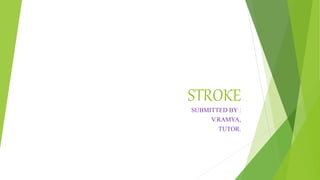STROKE.pptx
- 2. OUTLINE ? Introduction ? Risk Factors ? Prevention and control ? Life style ? Health Care Facilities ? Health Education ? Heat stroke ? Environmental and Personal factors ? Signs and Symptoms ? Prevention and control of Heat Stroke
- 3. Stroke
- 4. introduction ? Stroke is a world wide health problem. ? It is contributing to morbidity, mortality and disability in developing as well as developed countries. ? According to WHO stroke is rapidly developed clinical signs of focal disturbance of cerebral function, lasting more than 24 hours or leading to death, with no apparent cause other than vascular origin. ? The 24 hours threshold in definition exclude transient ischemic attack
- 5. STROKE ?Stroke is one of the leading cause of death and disability throughout the world. ?The WHO collaborative study showed that nearly one third of stroke patients died within 3 weeks.
- 6. risk factors ?Stroke is preceded by risk factors for years such as ? Hypertension, ?Ventricular hypertrophy, ? Cardiac dilatation,
- 7. risk factors ?Diabetes, ?Obesity, ?Smoking, ? Glucose intolerance, ?Oral contraceptives etc.
- 8. Factors ?Stroke can occur at any age. ? In one fifth, stroke occurs below the age 40 in India and it is found to be more in males than females. ?Stroke is associated with other diseases such as cardiovascular system or diabetes.
- 9. Prevention and Control ?Early detection and treatment of Transient ischemic attack to prevent the stroke
- 10. Life style ? Adopting the behaviour related to maintaining the health by changing life style pattern. ? This alteration in life style will control the diabetes and also manage the risk factors. ? Behavioural changes related to elimination of smoking, alcohol can prevent the occurrence of stroke.
- 11. Health care facilities ? The health care facilities should be available and within the access of people for proper treatment and follow up. ?The personnel working in health care facilities should be educated and trained enough to tackle the cases.
- 12. Health education ?Health education is an integral part of the prevention and control of stroke. ?People should be made aware about the disease and its consequences so as to achieve their participation.
- 13. Heat Stroke ?Heat stroke is sudden and occurs due to derangement of central heat regulating mechanism.
- 14. environmental factors ? The environmental factors such as ? Climate, ? Buildings, ? Clothing and ? Heavy work under hot ? And unfavourable weather can cause stroke .
- 15. personal factors ? The personal factors such as ? Deficiency of salt, ? Gastro-intestinal disorders, ? Thyroid disease and ? Severe water and salt losses predispose individuals to adverse effects of heat.
- 16. SIGS AND SYMPTOMS ?Diseases At the onset of heat stroke, ?Person complains of malaise, ?Headache, ?Dryness of skin, ?Nausea,
- 17. SIGS AND SYMPTOMS ?Vomiting, ?Irritable behaviour, ?Cramps, ?High temperature of 104-106°„F and tingling.
- 18. Prevention & Control of Heat Stroke ? Drink large amount of water when saw -eating is profuse. ? Wear light, porous and loosely fitted clothes to permit ventilation. ? Take adequate rest at work during hottest part of the day. ? Avoid exposure to sun directly during mid-day when the temperature is highest.
- 19. Prevention & Control of Heat Stroke ? Increase the physical exertion gradually to enable physiological adjustment to high heat in summer. ? In case of dizziness, ? Headache, ? Faint-ness, ? Blurring vision and ? Vomiting
- 20. Prevention & Control of Heat Stroke ? Immediate rest in shade, ?Cool place, ?Drinking of water preferably with salt, ?Loosening or removal of clothing to allow ventilation.
- 21. REFERENCES ? Neelam Kumari A Textbook of Community Health Nursing - I ,2011 Edition , Published by Pee Vee ( Regd .), Page reffered to 580- 581. ? /MrPramitKumarSah/stroke- presentation-77800548 ? /harshrastogi1/stroke-95028720 ? /rudra111/stroke-ppt-78095903





















